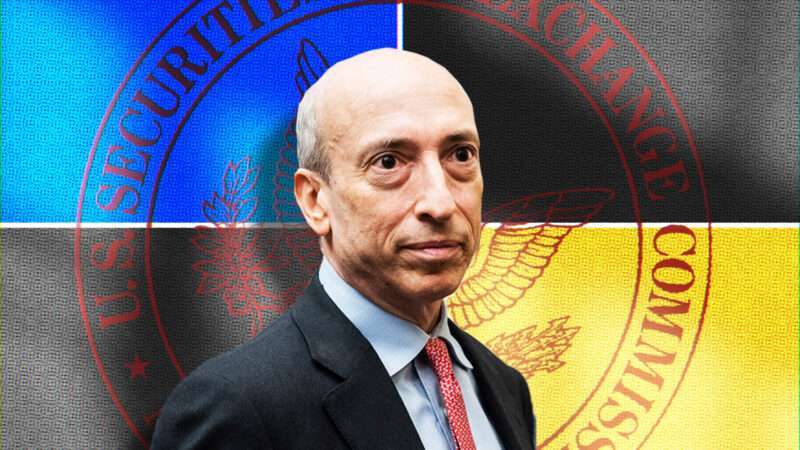
On Tuesday, the Securities and Exchange Commission (SEC), headed by Gary Gensler, sued crypto exchange Coinbase for not registering as a securities broker. The day prior, the SEC filed charges against Binance for operating an unregistered securities exchange, also accusing CEO Changpeng Zhao of civil fraud.
The core issue that's long been in dispute is whether cryptocurrencies are different from securities like stocks and bonds. If they are securities, as the SEC claims, firms like Coinbase and Binance have been illegally operating unregistered exchanges. In Coinbase's case, the SEC alleges that it has sold 13 crypto-assets (of the roughly 250 on offer) that ought to be registered with regulators, as they deem them to be securities. Coinbase's staking products are also deemed securities by the SEC, which the company disputes.
Many people within the crypto industry have long maintained that such digital assets should not be considered securities and that the regulatory framework surrounding crypto has been kept needlessly vague.
"I don't feel like there's a clear rulebook," Coinbase CEO Brian Armstrong told The Wall Street Journal this week. "The only sort of high-level statements they've made is that everything other than bitcoin is a security which, that's just not what it says in the law. By the way, that would also kind of mean the end of the crypto industry in the U.S."
The Coinbase news comes as no surprise. Back in March, the exchange was sent a Wells notice by the SEC, as Reason's Brian Doherty reported at the time, which informed the company that the agency had made a "preliminary determination" that it might be seeking enforcement action against Coinbase for purported securities law violations. "We asked the SEC specifically to identify which assets on our platforms they believe may be securities, and they declined to do so," Paul Grewal, Coinbase's chief legal officer, wrote at the time.
"In its filing on Tuesday, the S.E.C. detailed the ways in which Coinbase's leaders had demonstrated that they knew how the marketing and sale of digital assets should be governed under U.S. laws, even while failing to follow them," reported The New York Times.
But Coinbase disputes this characterization and contends that the legal framework just isn't clear, nor has it been established that cryptocurrencies are securities or ought to be treated as such. Armstrong argues that the crypto-assets Coinbase works with do not pass the securities-defining Howey test—(1) an investment of money; (2) in a common enterprise; (3) with a reasonable expectation of profits; (4) earned through the efforts of others—which is how securities are defined in the U.S., per a 1946 Supreme Court ruling. "All four of those things have to be true," Armstrong told The Wall Street Journal this week. "So there's various ways that you could imagine a crypto asset would not be a security, right; if it's sufficiently decentralized there's no common enterprise, right? If there's some specific utility surrounding it, it's not just for the purpose of the value going up, right?"
"Meanwhile, our industry continues to see new, conflicting statements from regulators instead of actual rules," wrote Grewal in March (emphasis in original):
"The Chair of the CFTC recently testified to Congress that Ethereum is a commodity, which the public has long understood to be the case. Then-CFTC Commissioner Quintenz has said that 'the SEC has no authority over pure commodities or their trading venues, whether those commodities are wheat, gold, oil…or crypto assets.' Current SEC Chair recently opined that perhaps BTC is the only digital asset commodity, which is entirely at odds with the position of the CFTC. If our regulators cannot agree on who regulates which aspects of crypto, the industry has no fair notice on how to proceed. Against this backdrop, it makes no sense to threaten enforcement actions against trusted public companies like Coinbase who are committed to playing by the rules."
The SEC's case against Binance has some crucial differences from its case against Coinbase. Binance issues its own tokens, while Coinbase doesn't. Coinbase is a publicly traded company, thus subject to certain disclosure rules, but Binance isn't. And Coinbase's chief executive has not been accused of fraud by the agency the way Zhao has.
Armstrong, Grewal, and others emphasize that U.S. regulators' vagueness—or outright antagonism—will just drive the crypto industry out of the country.
Many industry insiders interviewed by Reason at the Bitcoin 2023 conference several weeks ago said much the same. With Bittrex shutting down U.S. operations, Gemini looking to operate in the United Arab Emirates, and Coinbase opening a derivatives exchange in Bermuda last month, tons of exchanges seem to see the regulatory writing on the wall and are eyeing the exit.
The post Gary Gensler's SEC Cracks Down on Coinbase and Binance appeared first on Reason.com.







